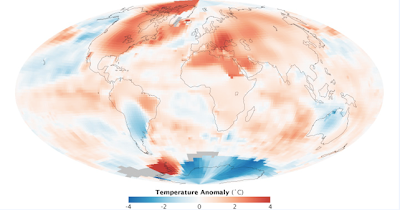- The above is the global temperature anomaly map for July 2012 - the hottest month in recorded history for the lower 48 states of the US - from NASA GISS (h/t Desdemona Despair).
- New CAFE rules should be finalized this month.
- The price of hay in the midwest has doubled due to the drought. If there was a cellulosic ethanol industry there, it'd be hurting.
- Making soft robots that can move and camouflage themselves. Words fail.
- Record low sea ice area in the Arctic already - and still several weeks to go to the minimum.
- United States on track for worst fire year since records began.
- It's also challenging to keep the Mississipi open for boat traffic.
- Economists discover in 2012 that loan-to-income rules would have been a good idea during the housing bubble. We're glad you finally figured that one out...
- Inflation is more cyclical than has been measured, due to store switching (going to Walmart during recessions).
Tuesday, August 21, 2012
Interesting Links: Tuesday Edition
Subscribe to:
Post Comments (Atom)


4 comments:
Hello Stuart, blog about record low ice on nothern hemisphere is also interesting:
The untold drama of Northern snow cover
I notice Antarctic temps for the most part below normal.
Did this effect precipitation there? The continent holds most of the worlds ice... provided precipitation does not decline with temperatures this might negate the effects of ice melt in the Arctic.
I can't think that extra snow fall and ice build up in the Antarctic would negate Arctic ice formation. While extra southern ice could certainly forestall sea level rise some, especially since Arctic ice is largely floating ice, (melting or not, it won't affect sea level much, Greenland excepted) it seems to me the biggest danger with melting Arctic ice is the reduced temperature gradient between equatorial regions and the Arctic, causing all the slowing Rossby Waves, and so on, Stuart has covered previously. In short, I would expect North American and Eurasian climate to be much more heavily influenced by a melting Arctic, almost regardless of what the landlocked Antarctic does.
Greg: generally speaking, Antarctica has been losing mass at an accelerating pace not gaining it:
http://www.sciencemag.org/content/326/5950/217.1.full?sid=e0f6fff5-54bf-4f0f-ba1f-766ab5decdb3
Also, melting of the polar sea ice has no implications for sea level rise as the ice is floating - it only displaces it's own weight in seawater. However, presumably missing summer sea-ice is going to accelerate warming of Greenland (which can affect sea level). There's also potential for fairly large impacts on northern hemisphere (which we may already be seeing).
Post a Comment